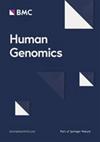Integrated multiomics revealed adenosine signaling predict immunotherapy response and regulate tumor ecosystem of melanoma
IF 3.8
3区 医学
Q2 GENETICS & HEREDITY
引用次数: 0
Abstract
Extracellular adenosine is extensively involved in regulating the tumor microenvironment. Given the disappointing results of adenosine-targeted therapy trials, personalized treatment might be necessary, tailored to the microenvironment status of individual patients. Here, we introduce the adenosine signaling score (ADO-score) model using non-negative matrix fraction identified patient subtypes using publicly available melanoma dataset, which aimed to profile adenosine signaling-related genes and construct a model to predict prognosis. We analyzed 580 malignant melanoma samples and demonstrated its robust value for prognosis. Further investigation in immune checkpoint inhibitor dataset suggests its potential as a stratified factor of immune checkpoint inhibitor efficacy. We validated the power of the ADO-score at the protein level immunofluorescence in a melanoma cohort from Xiangya Hospital. More importantly, single-cell and spatial transcriptomic data highlighted the cell-specific expression patterns of adenosine signaling-related genes and the existence of adenosine signaling-mediated crosstalk between tumor cells and immune cells in melanoma. Our study reveals a robust connection between adenosine signaling and clinical benefits in melanoma patients and proposes a universally applicable adenosine signaling model, the ADO-score, in gene expression profiles and histological sections. This model enables us to more precisely and conveniently select patients who are likely to benefit from immunotherapy.综合多组学揭示腺苷信号转导可预测黑色素瘤的免疫疗法反应并调控肿瘤生态系统
细胞外腺苷广泛参与调节肿瘤微环境。鉴于腺苷靶向治疗试验的结果令人失望,可能有必要根据个体患者的微环境状况进行个性化治疗。在此,我们利用公开的黑色素瘤数据集,采用非负矩阵分数识别患者亚型,推出了腺苷信号转导评分(ADO-score)模型,旨在剖析腺苷信号转导相关基因并构建预测预后的模型。我们分析了 580 个恶性黑色素瘤样本,证明了该模型对预后的稳健价值。对免疫检查点抑制剂数据集的进一步研究表明,它有可能成为免疫检查点抑制剂疗效的分层因素。我们在湘雅医院的黑色素瘤队列中验证了ADO-score在蛋白质水平免疫荧光上的作用。更重要的是,单细胞和空间转录组数据强调了腺苷信号相关基因的细胞特异性表达模式,以及黑色素瘤中肿瘤细胞和免疫细胞之间存在腺苷信号介导的串扰。我们的研究揭示了腺苷信号转导与黑色素瘤患者临床获益之间的密切联系,并在基因表达谱和组织学切片中提出了一个普遍适用的腺苷信号转导模型--ADO-score。该模型使我们能够更准确、更方便地选择可能从免疫疗法中获益的患者。
本文章由计算机程序翻译,如有差异,请以英文原文为准。
求助全文
约1分钟内获得全文
求助全文
来源期刊

Human Genomics
GENETICS & HEREDITY-
CiteScore
6.00
自引率
2.20%
发文量
55
审稿时长
11 weeks
期刊介绍:
Human Genomics is a peer-reviewed, open access, online journal that focuses on the application of genomic analysis in all aspects of human health and disease, as well as genomic analysis of drug efficacy and safety, and comparative genomics.
Topics covered by the journal include, but are not limited to: pharmacogenomics, genome-wide association studies, genome-wide sequencing, exome sequencing, next-generation deep-sequencing, functional genomics, epigenomics, translational genomics, expression profiling, proteomics, bioinformatics, animal models, statistical genetics, genetic epidemiology, human population genetics and comparative genomics.
 求助内容:
求助内容: 应助结果提醒方式:
应助结果提醒方式:


